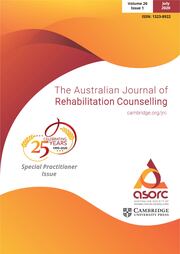No CrossRef data available.
Article contents
Implementing a Suitable Jobs Register in the Construction Industry: Preliminary Evidence
Published online by Cambridge University Press: 15 October 2015
Abstract
This pilot study investigated the efficacy of a job register index to support return to work (RTW) for injured workers in the construction industry. Participants included injured workers (n = 22), supervisors/managers (n = 23), treating practitioners (n = 5), occupational rehabilitation consultants (n = 5), union representatives/occupational health and safety representatives (n = 5), RTW coordinators (n = 2), steering committee members (n = 4) and the designated project officer (n = 1). A pre–post test intact group design was used to evaluate the perceived utility of the job register. A partial set of the sample including injured workers and supervisors/managers participated in the pretrial phase (n = 28) while the trial phase included more numerous stakeholder groups to assess the perceived utility of the register (n = 39). Participants completed surveys that incorporated a number of differing sections including injury description and circumstances, communication and collaboration with others, their overall opinion of the return to work process in general and suggestions for future improvements. Additional questions were designed for those participating in the trial with regards to the efficacy of the register. Data were analysed using analysis of variance procedures with pairwise comparisons of pre–post intervention test means. Alternative job options were seen to be offered more frequently. Communication and cooperation improved postimplementation. Supervisors perceived the job register a useful innovation to facilitate RTW. The register represents a new resource to the construction industry with potential for wider application following further study.
- Type
- Articles
- Information
- The Australian Journal of Rehabilitation Counselling , Volume 17 , Issue 1 , 01 June 2011 , pp. 15 - 25
- Copyright
- Copyright © Cambridge University Press 2010




